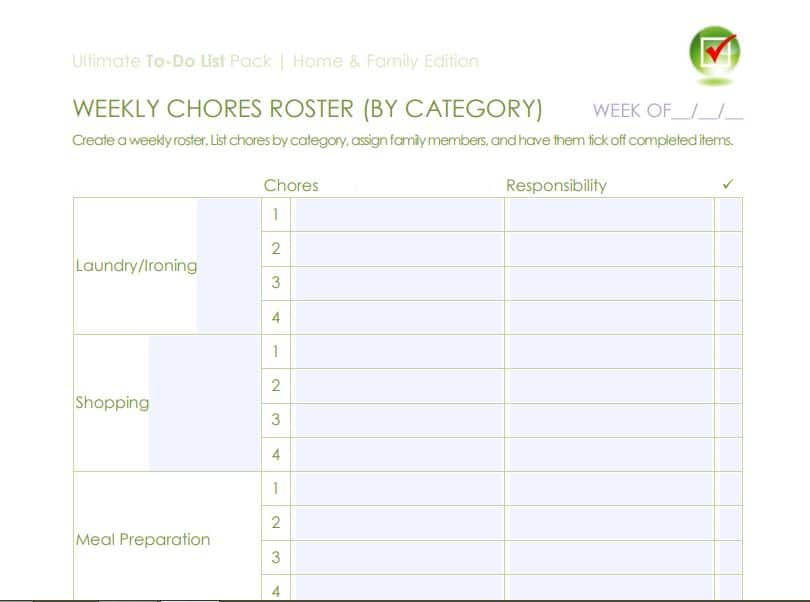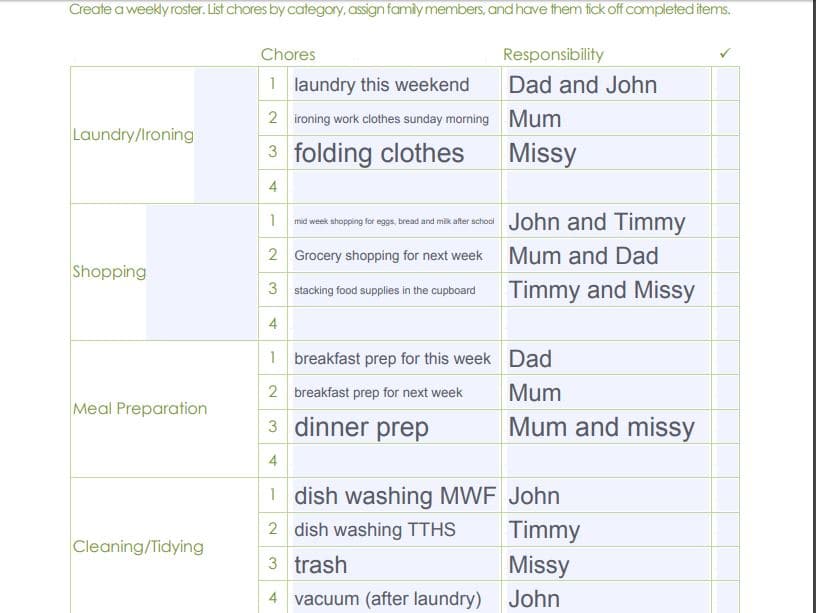Whenever your day ends, you might find yourself reflecting on the stresses of daily life.
Stress from work and at home can affect a person’s well being and the family as a whole.
Even washing the dishes can start an argument or some misunderstanding between spouses and their kids if stress is a factor. Arguments over chores can slowly drive people to fight and strain relationships. Some of you may think that such arguments are shallow, but it happens every day.
The unequal distribution of chores contributes to 30% of divorces. If one person is doing more than the other, that person’s quality of life can go down. Grudges formed because of unfair workloads are not worth the aggravation.
Try to divide up chores equally – it’s better for your relationship! Laundry, cleaning, grocery shopping, vacuuming and other chores are done on a regular basis. Some people have no issues doing them and some find it a nuisance, but there should be a balance of responsibilities to make it work.
If there are kids older than 5 years old, they should learn some light household chores. Making their bed every morning is a good start. If they are between 10-13 years old, the kids should know how to vacuum, put out the trash and wash the dishes. If you have teenagers, buying some groceries can lighten the burden, or they can clean the car once a week. They can also help declutter the house.
Dividing the Family Chores
Each family is unique and will have their own solution when dividing house chores. Below are some tips that can help you to divide chores and get started.
1. Go For A Team Approach
Couples with kids are the best at teamwork because each parent knows the big picture and the overall needs of the household. Make a list of regular chores and frequent activities that need to happen in the house. This might include cooking, cleaning, washing the car, etc. Teenagers especially should have their own cleaning responsibilities. Assign who will clean the table, do the dishes for the night and who takes out the trash. These simple household chores will teach them how to be responsible and how to help each other.
2. Take Turns
Take turns each day or each week for certain household chores. This will teach everyone in the household how to do each chores and it doesn’t get so boring doing the same thing every time. But make sure that each turn is fair. For example, for a certain week, your other half will take care of the laundry, grocery shopping and taking the kids to school and vice versa. Check who is responsible for a certain task and see if one family member is doing more than the others.
3. Gender Has Nothing To Do With Chores
Your kids will likely say that this task is just for girls and this task is just for boys. Everyone needs to learn something new or a variety of skills. Teach your kids how to do these skills and how to be responsible and they will know the value of equality and fair work.

4. Keep It Fair
The goal of dividing each chore between family members is to be fair and to make it feel like they are being supported by the other family members. Make a list of the division of chores (we’ll show you how to do this below) and take a look. Give feedback and talk about any unfair chore distribution.
5. Make A Chores Roster
Have a to-do list that shows each task for each family member. Schedule each task for each member and make them responsible for doing their chores. You can write it on a piece of paper, a chart, on a calendar or on a whiteboard. You can also download and print a free and interactive Weekly Chores Roster (21.08). This to-do list will give you a list of chores by category where you can assign family members and tick off the completed items.
How To Use The Weekly Chores Roster (21.08)
Step 1: Download the Weekly Chores Roster PDF
The Weekly Chores Roster (21.08) is one of our most popular free interactive productivity lists. Click here to download the Weekly Chores Roster PDF
Step 2: Choose How You Use The Weekly Chores Roster
You can use the to-do list in two ways:
- Click on the Weekly Chores Roster (20.18) in the PDF list and print it out.
- Click on Weekly Chores Roster PDF and type your tasks in the interactive list. Each task category is divided by chores and responsibility where you can write the name of the family member assigned to it.
- Save the PDF once you’re done and email it to your family members or make sure it’s easy to find on the home computer.
Step 3: Fill In List
Write or type in the names and the chores for each category and tick off every completed task.
Visual Sample of The Weekly Chores Roster
Below is a screenshot example of the interactive Weekly Chores Roster


All To-do lists are beautifully laid out and fully interactive – type directly in the lists, search and save. Or simply print and write directly on the list if you prefer. All of our To-do lists work with the free Adobe PDF Reader Click on the button below to get started.



I love this blog!! Homeadvisor
Excellent information on your site, thanks for the platform to allow us make comments.gypsum board
Pingback: How To Stay Healthy & Well As A Busy Mom | OC Mom Blog
Your content is given more knowledgeable content and you show great authors.
This is such a great resource that you are providing and you give it away for free.
Pingback: Useful tips for moving back in with your parents | Hansen Bros. Moving & Storage
Pingback: How to Plan The Perfect Family Night In - St. Louis Dad
These graphics are extraordinary? How did you design them? I also see these type of graphics on this website and I love them tbh.
Thank you for telling me that dividing chores equally between me and my husband is definitely good for our relationship. We’ve both been busy these days and I sometimes find myself getting too irritated since he can’t look after his own things and I sometimes do the same. It might be better to follow your advice and schedule things and chores accordingly while we leave heavy ones like carpet cleaning to professionals.
Pingback: Effective Tips On How To Manage Household Chores and Work | Code WordT
Love the graphic you included! I find that if you make chores fun or use technology to do them, kids are more inclined to help out.
Pingback: How to Make Your Home a More Stress-Free Place
I agree that gender has nothing to do with chores. Everyone must learn with the chores equally. Very informative, thanks for sharing!
Thanks for sharing very informative post very helpful for me.
Suck it up on yahoo account
Dividing the work with the family does not only make the household work lighter, it also gives a closer bond between the members of the family.
Hi Angie – By doing chores, kids learn vital life skills that help them live independently in adult life. Without learning how to do chores (by getting involved at a young age), then they will always rely on others to help them, or live in a dirty and messy home. Hope this helps!
The family members should always support each other. If everyone is working in a family then dividing the household chores can ease out the things for everyone. I love your tips and must admit that I am being addicted to your blog!
Pingback: Best Money Tips: How to Maintain Friendships As An Adult – Thoko- Cash Deals
Is this a new excuse to force household chores on kids? Unequal distribution of chores among partners does that, leave the kids out! I fully agree that both partners should equally share in housework. Kids need education and play. Also its good to teach them skills and encourage them [not make them] help. Most children will help if encouraged. Concerning the other excuses used I have written an article which I can send you if you want. By the way kids should pick up their toys after playing, put their jacket away after coming home, etc these are not chores they are good manners. Stop trying to find excuses to burden kids with your household chores its DISGUSTING!
Having children do chores is an education. Cleaning, cooking, being responsible for one self and what we’re given is a life long endeavor. If we teach them these things when they are young is in everyone’s best interest. Not only for themselves but for their future mates and children. It will help them in their adult lives not only in the home but in the world they will live in. I feel this is not only our duty as parents, but as citizens of the world.
There is something about the adult in the room that has no concept of what it takes to maintain a household. These are adults often raised without the responsibility of chores. Do the world a favor teach your children when they are young to respect and value the environment they inhabit by taking the time to care for it!